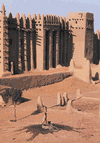
Djenné
also spelled Jenne or Diennéancient trading city and centre of Muslim scholarship, southern Mali. It is situated on the Bani River on floodlands between the Bani and Niger rivers, 220 miles (354 km) southwest of Timbuktu. Djenné was founded in the 13th century near the site of Djenné-Jeno, an ancient city then in decline, and grew into an entrepôt between the traders of the central and western Sudan and those of Guinea's tropical forests. It was captured in 1468 (or 1473) by the Songhai emperor Sonni 'Ali. The city benefited both from its direct connection by river with Timbuktu and from its situation at the head of the trade routes to the gold mines of Bitou (now in Côte d'Ivoire), to Lobé, and to Bouré; it was also an important entrepôt for salt. By the mid-17th century, Djenné was renowned as a centre of Muslim learning. The city was besieged after 1818 and subsequently subdued by the Fulani ruler of Macina, Shehu Ahmadu Lobbo, who expelled those inhabitants practicing a form of Muslim worship that he disapproved of and allowed its mosque to fall into ruin.
Djenné was conquered by the Tukulor emperor 'Umar Tal about 1861 and was occupied by the French in 1893. Thereafter its commercial functions were taken over by the town of Mopti, situated northeast of Djenné at the confluence of the Niger and Bani rivers. Djenné is now an agricultural trade centre, of diminished importance, with several examples of Muslim architecture, including its large, mud-walled mosque rebuilt in the early 20th century. The mosque and other historic buildings were designated a World Heritage site in 1988. A weekly market attracts people from throughout the region. Pop. (1998 prelim.) 19,200.
Copyright © 1994-2005 Encyclopædia Britannica, Inc.

